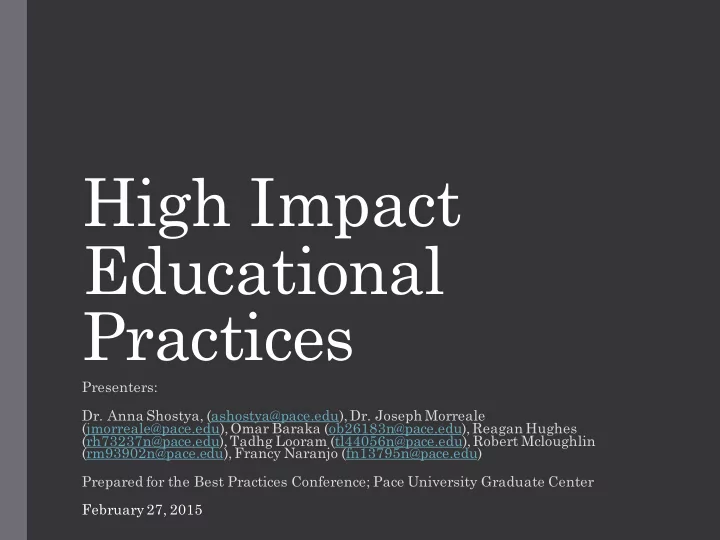

High Impact Educational Practices Presenters: Dr. Anna Shostya, (ashostya@pace.edu), Dr. Joseph Morreale (jmorreale@pace.edu), Omar Baraka (ob26183n@pace.edu),Reagan Hughes (rh73237n@pace.edu), Tadhg Looram (tl44056n@pace.edu), Robert Mcloughlin (rm93902n@pace.edu), Francy Naranjo (fn13795n@pace.edu) Prepared for the Best Practices Conference; Pace University Graduate Center February 27, 2015
Short-term Study Abroad Course to China as a High Impact Educational Practice: A Student’s Perspective Presenters: Omar Baraka (senior), Reagan Hughes (junior), and Francy Naranjo (senior)
High Impact Practices: “an investment of time and energy over an extended period that has unusually positive effects on student engagement in educationally purposeful behavior.” George D. Kuh , “ Foreward ,” Five High-Impact Practices: Research on Learning Outcomes, Completion, and Quality by Jayne E. Brownell and Lynn E. Swaner, AAC&U, 2010
Types of High Impact Learning Practices • First-year experiences • Undergraduate research • Common intellectual • Diversity/global experiences learning • Learning communities • Service learning • Writing-intensive • Community-based courses learning • Collaborative • Internships assignments and projects • Capstone courses and projects High-Impact Educational Practices: What They Are Who Has Access to Them and Why They Matter by George D. Kuh (AAC&U 2008 ) Follow-up study: Five High-Impact Practices: Research on Learning Outcomes, Completion, and Quality, by Jayne E. Brownell and Lynn E. Swaner CALT has copies of both publications
Any Questions?
How to Make a Travel Course a High Impact Educational Practice: Faculty’s Recommendations Presenters: Dr. Morreale and Dr. Shostya, Economics Department, NYC
How to Make a Travel Course a High Impact Educational Practice: Faculty’s Recommendations • Potential challenges and threats • Choosing the right itinerary • A priori decision: How much freedom shall they enjoy? • Choosing the ‘right’ travelers • Pre-travel meetings: Familiarizing students with the country-specific environment (Culture, sanitation, cuisine, transportation, etc) • a Do’s and Don’ts list and a list of things for students to pack • The logistics and the role of the host institution • Rewards to students and faculty: A high impact experience for all
Short-term Study Abroad Course to China as a Stepping Stone for Undergraduate Research: A Students’ Perspective Presenters: Robert McLoughlin (senior) and Tagdh Looram (junior)
Types of High Impact Learning Practices • First-year experiences • Undergraduate research • Common intellectual • Diversity/global experiences learning • Learning communities • Service learning • Writing-intensive • Community-based courses learning • Collaborative • Internships assignments and projects • Capstone courses and projects High-Impact Educational Practices: What They Are Who Has Access to Them and Why They Matter by George D. Kuh (AAC&U 2008 ) Follow-up study: Five High-Impact Practices: Research on Learning Outcomes, Completion, and Quality, by Jayne E. Brownell and Lynn E. Swaner CALT has copies of both publications
“To Play or Not to Play: How Video Games and Other Media Usage Affect Students’ Performance” Pace University Research Poster Session
“The Effect of Various Multimedia Usage on College Students’ Studying Habits and Academic Performance” Undergraduate Faculty-Student Research Grant Eastern Economic Association Conference – Boston, MA Undergraduate Resarch First Place Winner Submission to Professional Publication: “Journal of College Reading and Learning”
“Socio -Economic Factors Influencing Chinese Students’ Decision to Study Abroad” Undergraduate Faculty-Student Research Grant May 2014
“The Role of Confucianism and History in the Red Dragon’s Business Culture” Julieth Saenz & Dr. Anna Shostya NYCOS Essay Contest Third Place “Urbanization in China and Implications for the Environment: Focusing on Shanghai” Jonathan DeLeon, Bridget McCabe, & Dr. Joseph Morreale NYCOS Essay Contest Second Place
Thank you!
Mutual Expectations of Students and Faculty in Undergraduate Research: A Students’ Perspective Presenters: Tagdh Looram (junior) and Robert McLoughlin (senior)
Recommend
More recommend